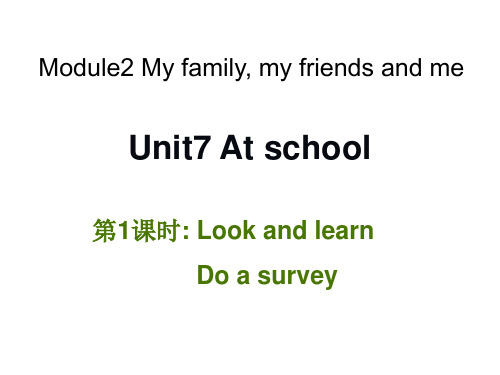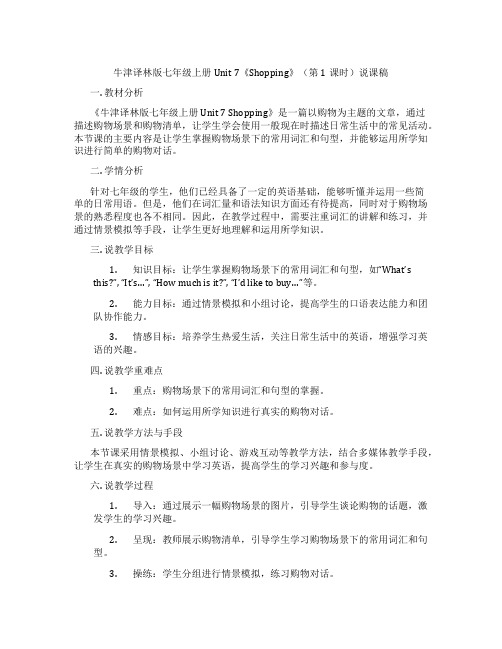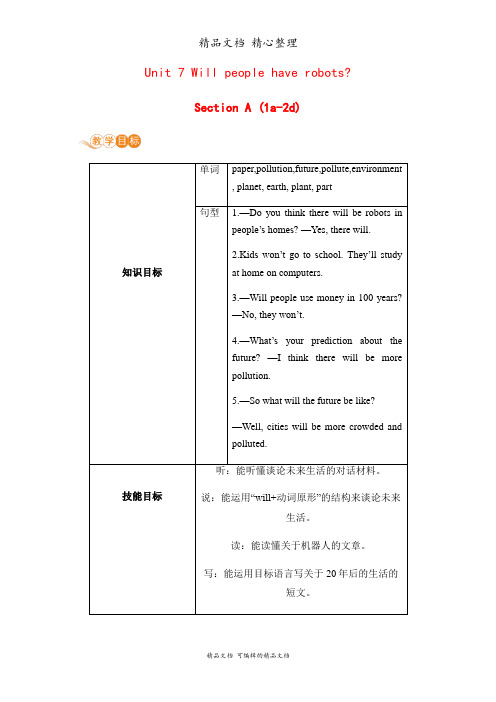Unit7第1课时
四年级英语上册:Unit 7《At school》(第1课时)

Summary
学校设施类单词: school, classroom, library, office, playground, toilet 描述某处有某物: There is/are + 某物 (+ 其他)。
Homework
1. 听录音,跟读单词。 2. 抄写单词4遍英语,1遍汉语。 3. 预习Listen and say。
=There aren’t any cars in the city.
按要求改写下列句子。
There is a plate on the desk. (改为否定句) —Th—er—e i—sn—’t a—p—la—te—on—th—e—de—sk—. —————— There aren’t any students in the classroom. (改为肯定句) T—he—re—a—re—so—m—e —stu—d—en—ts—in—th—e c—la—ss—ro—om—. —
There’s a library in our school. There are many classrooms in our school. There be句型遵循就近原则。 There is + 单数名词 + 其他。 re填空.
There __i_s__ a playground in our school. There __a_re__ four offices in our school. There __a_re__ many buildings in the city. There __i_s__ a boy in the shop.
Do you know?
There’s a cat in the house.
Unit 7 第1课时 课文讲解及单词拓展-六年级英语下册(牛津上海版)

2
3
4
5
5-3
C
All of the apples are green.
1
2
3
4
5
None of the apples are red.
//
5-4
C
all of …
most of …
some of …
none of …
5-5
1
2
3
4
5
C
Complete the sentences with ‘all of’, ‘most of’, ‘some of’ or ‘none of’.
//
C
5-5
1
2
3
4
5
Many people like travelling by bus.
In the past, all passengers had to buy tickets from a bus conductor.
He or she collected money from the passengers and put it in a bag.
None of
Some of
Some of
Most of
Look and learn
C
1
2
3
3-1
a single-decker bus
a double-decker bus
//
//
C
1
2
3
3-2
a bus conductor
a fare b card
C
5-4
1
2
3
4
5
In the past, none of the bus drivers were women. All of them were men. Nowadays, some of the bus drivers are women, but most of them are still men.
牛津译林版七年级上册Unit7《Shopping》(第1课时)说课稿

牛津译林版七年级上册Unit 7《Shopping》(第1课时)说课稿一. 教材分析《牛津译林版七年级上册Unit 7 Shopping》是一篇以购物为主题的文章,通过描述购物场景和购物清单,让学生学会使用一般现在时描述日常生活中的常见活动。
本节课的主要内容是让学生掌握购物场景下的常用词汇和句型,并能够运用所学知识进行简单的购物对话。
二. 学情分析针对七年级的学生,他们已经具备了一定的英语基础,能够听懂并运用一些简单的日常用语。
但是,他们在词汇量和语法知识方面还有待提高,同时对于购物场景的熟悉程度也各不相同。
因此,在教学过程中,需要注重词汇的讲解和练习,并通过情景模拟等手段,让学生更好地理解和运用所学知识。
三. 说教学目标1.知识目标:让学生掌握购物场景下的常用词汇和句型,如“What’sthis?”, “It’s…”, “How much is it?”, “I’d like to buy…”等。
2.能力目标:通过情景模拟和小组讨论,提高学生的口语表达能力和团队协作能力。
3.情感目标:培养学生热爱生活,关注日常生活中的英语,增强学习英语的兴趣。
四. 说教学重难点1.重点:购物场景下的常用词汇和句型的掌握。
2.难点:如何运用所学知识进行真实的购物对话。
五. 说教学方法与手段本节课采用情景模拟、小组讨论、游戏互动等教学方法,结合多媒体教学手段,让学生在真实的购物场景中学习英语,提高学生的学习兴趣和参与度。
六. 说教学过程1.导入:通过展示一幅购物场景的图片,引导学生谈论购物的话题,激发学生的学习兴趣。
2.呈现:教师展示购物清单,引导学生学习购物场景下的常用词汇和句型。
3.操练:学生分组进行情景模拟,练习购物对话。
4.巩固:学生通过游戏互动,进一步巩固所学知识。
5.拓展:学生分组讨论,设想自己要去购物,列出购物清单,并准备一段购物对话。
6.展示:学生上台展示自己的购物对话,其他学生进行评价。
7.总结:教师对本节课的内容进行总结,强调购物场景下的常用词汇和句型。
三年级上册英语教案Unit7Lesson1第一课时教案鲁教版

三年级上册英语教案 Unit7 Lesson1第一课时教案鲁教版教学内容本节课是鲁教版三年级上册英语Unit7 Lesson1的第一课时。
课程内容主要围绕日常生活用品的英文表达和简单句型构造。
学生将学习到如何用英语描述家中常见的物品,并能够进行简单的英语对话。
教学目标1. 让学生掌握Unit7中关于日常用品的关键词汇,如“pen”、“pencil”、“book”等。
2. 培养学生运用英语构造简单句子的能力,例如:“This is a pen”。
3. 提高学生的听说技能,使他们能够就日常用品进行基本的问答。
4. 增强学生对英语学习的兴趣,培养他们的自主学习能力。
教学难点1. 新词汇的发音准确性和记忆。
2. 句型的正确构造和实际应用。
3. 学生在口语交流中的自信心建立。
教具学具准备1. 课文教材。
2. 多媒体设备,用于播放音频和视频资料。
3. 词汇卡片。
4. 小组活动用的工作表。
教学过程1. 导入:通过简单的日常英语对话,复习之前学过的相关内容,引入新课。
2. 新知识呈现:使用多媒体展示新课的词汇和句型,让学生跟读并模仿。
3. 互动练习:组织学生进行角色扮演,模拟购物场景,练习新学的词汇和句型。
4. 小组活动:学生分组完成工作表,巩固所学知识。
板书设计板书将清晰地展示本节课的主要教学内容,包括词汇表、关键句型以及相关的语法点。
同时,板书上还将附有简单的示例对话,帮助学生理解词汇和句型的实际应用。
作业设计1. 完成课后练习册中与本课相关的内容。
2. 用英语描述家中的三件物品,写下来并尝试构造简单句子。
3. 家长协助,模拟购物场景,用英语进行对话练习。
课后反思本节课结束后,教师应反思教学过程中的有效性和学生的参与度。
特别关注学生在发音和句型构造方面的掌握情况,并根据学生的反馈调整教学方法和节奏,确保每位学生都能跟上课程进度,并有效吸收和应用所学知识。
此教案设计遵循了教学内容的严谨性和教学过程的连贯性,确保了学生在学习过程中的积极参与和实际操作,同时兼顾了课后对学习效果的巩固和提升。
新人教版八年级上册英语 Unit 7 第1课时 教案(教学设计)

Unit 7 Will people have robots?Section A (1a-2d)单词paper,pollution,future,pollute,environment1.掌握一般将来时的意义和结构。
2.掌握There be句型的一般将来时的结构。
1.掌握more/fewer;more/less的用法。
2.“will +动词原形”表达一般将来时态。
Step 1以机器人相关视频来导入新课,调动学生学习的积极性。
Warming up and leading inShow Ss a video about robots and ask them some questions after watching it:What can you see in the video?Do you think it possible that every home has a robot?What can robots do for us?Step 2用形象的方式帮助学生掌握新词汇。
让学生在预测的过程中加深对词汇的理解。
1.New wordsShow Ss some pictures of the new words in this period: paper, pollution, future, planet, earth, plant.2.Work on 1a①Ask Ss to read the predictions in 1a. Let them think about how the world will be different 100 years from now.②Get Ss to check (√)A for agree or D for disagree. Then check the answers with the class together.【Keys: Answers will vary.】Step 3让学生在听的过程中掌握抓住关键信息的方法。
Unit 7 第1课时 课本讲解及词汇拓展-七年级英语下册(牛津上海版)

12. talk about 讨论,谈论 ◆ We can talk about the problem at the meeting. ◆ 常用表达:talk about sth. 讨论某事 talk with sb. 和 某人交谈 talk about sth. With sb. 和某人讨论某事 近义词辨析: talk / tell / speak / say 1). talk 强调双方“交谈”,一般用作不及 物动词。 ◆ What are they talking about ? He is talking with a
friend.
2). tell “告诉、告知”,指某人把某一件事、一条信息传送给别人或讲述一件 事,常用做及物动词。 ◆ 常用表达:tell sb. sth. tell sb (not) to do sth. ◆
He told the children not to play in the street. What did your mother tell you just now?3). speak“说话”,作不及物动词,常指说话的能力和方式;作及物动词, 其后的宾语为某种语言。 ◆ 常用表达:speak to sb. speak Chinese ◆ May I speak to Mr. Green? (电话用语:我可以和XXX说话吗?) Joe can speak a little Chinese.4). say“说出、说过”,强调说话的内容,一般用作及物动词。 ◆ 常用表达:say to sb. ◆ He often says “hello” to me with a smile. I can
9. keep v. (1) 作及物动词时: ◆ 保留,保存,保持,留下 We’d better keep a seat for him. ◆ 遵守(反义词:break) Everybody must keep the law. ◆ 赡养;饲养 The old man keeps many animals like dogs, pigs and cats and so on. ◆ 经营,管理 He kept a hotel in this city. ◆ 保守(秘密),记(日记) Some of them keep diaries. ◆ 使...处于某种状态 He kept me waiting for half an hour. (2) 作不及物动词时: ◆ 保持,继续(处于某种状态) Please keep quiet. He always kept silent at meeting. ◆ (食物)保持良好状态
Unit 7 Section A 第1课时示范公开课教案【英语人教新目标七上】

Unit 7 How much are the socks?Section A (1a—2d)教学设计一、教学目标1. 能够熟练掌握本课重点词汇和短语:much, sock, T-shirt, sweater, trousers, shoe, shirt, dollar, pair, big, small, short, long, how much, a pair of2. 熟练掌握本课重点句型:(1) —How much is this T-shirt?—It’s seven dollars.(2) —How much are these socks?—They’re two dollars.3. 能够听懂谈论衣物价格、颜色和大小的对话内容,并从中获取关键信息。
4. 能够运用How much …? 句型谈论物品的价格。
5. 能够了解常见的货币单位和移动支付模式。
二、教学重点及难点重点:1. 能够听懂有关谈论衣物价格、颜色和大小的对话内容,并从中获取关键信息。
2. 能够运用How much …? 句型谈论物品的价格。
难点:能够运用How much …? 句型谈论物品的价格。
三、教学过程四、板书设计Unit 7 How much are these socks?第1课时Section A (1a—2d)1. Key words: much, sock, T-shirt, sweater, trousers, shoe, shirt, dollar, big, small, short, long, pair, how much, a pair of2. Key sentences:(1) —How much is this T-shirt?—It’s seven dollars.(2) —How much are these socks?—They’re two dollars.。
Unit7 School clubs第一课时Reading Ⅰ课件ppt

a. take
b. look at or buy
2. When you attend a class, you __b___ it.
a. leave
b. go to have
Practice
3. When a mum teaches her child to make a cake, she ___a___. a. show him/her how to do it b. makes it for him/her
Vocabulary
power n. 力量
/ˈpaʊə(r)/ the power of ......的力量 e.g. Only now can I begin to apprehend the power of these forces.
Vocabulary
attend v. 参加
/əˈtend/ attention n. 注意 e.g. Last month, they attend the Club Fair.
Let’s do it
red jacket. It _d_i_s_a_p__p_e__a_r_e_d__! I wanted to buy _a_n_o__t_h_e__r one. But a few minutes later, an old lady found it and gave it back to me! I was very __s_u_r_p__r_is_e__d__. People in small towns are so nice! Do you have fairs like this in your country? Best wishes, Kelly
Photography Club Robot Club Rocket Club Solar Power Club
- 1、下载文档前请自行甄别文档内容的完整性,平台不提供额外的编辑、内容补充、找答案等附加服务。
- 2、"仅部分预览"的文档,不可在线预览部分如存在完整性等问题,可反馈申请退款(可完整预览的文档不适用该条件!)。
- 3、如文档侵犯您的权益,请联系客服反馈,我们会尽快为您处理(人工客服工作时间:9:00-18:30)。
Unit 7 Will people have robots ?(SectionA1a—2c)第一课时学习目标和重难点1. 掌握的重点单词和短语单词:will, robot, won't=will not, they'll=they will, everything, paper,she’ll=she will, building.短语:in the future(在将来),be free(免费),live to be(活到……), in 100 years(一百年后),in high school(在高中),in college(在大学).2. 背诵句子:(1)—Will people use money in 100 years?(人们在100年后还用钱吗?)—Yes, they will./No, they won't.(2)Everything will be free.(每件东西将会免费。
)3. 背诵:P87—1b;自学语法要点第3页,朗读并背诵。
学习过程:一、预习·导学1. 在书本P2和P4上找到下列单词及词组:在书本上用红笔圈出单词,用红线画出词组并写上中文will, robot, won't=will not, they'll=they will, everything, paper,she’ll=she will, building. 短语:in the future(在将来),be free(免费),live to be(活到……), in 100 years(一百年后),in high school(在高中),in college(在高中).2. 翻开书本P103抄写2、4页上的单词三遍加一遍中文意思。
把不会的单词在前面打钩。
()()()()()()()()3. 抄写重点短语词组三遍及中文意思一遍。
()()()()()()4. 抄写P2 1c 的对话一遍并背诵。
A:B:A:5. 语言点导学:(一)我们以前学过哪几种时态表将来?⑴be going to + V原形①以人为主语,表示计划、打算去做某事,这种计划和打算往往是事前就有的。
She is going to leave tomorrow.(她明天将离开。
)②表示人根据已有的事实和迹象,认为某事即将发生. It’s going to rain.(天快要下雨了。
)⑵be + V-ing(现在进行时)表示按计划、安排即将发生的动作.I’m going bike riding.(我将去骑车旅行。
)(二)今天我们学习另一种一般将来时一般将来时:一般将来时表示将来发生的动作或情况,最基本的结构:will + 动词原形肯定句:主语+ will +动词原形+(宾语)+其他成份People have robots in their homes.否定句:在will 的后面加not即可。
will not = won’t People have robots in their homes.一般疑问句:把will 提到句子主语之前,结尾变问号。
people have robots in their homes? Yes, they / No, they .“in与after+时间” 都可表示“在…之后”。
当它们用于一般将来时态时,in后接“时间段”,after后接“时间点”。
1) He’ll come back three years. 他三年以后回来。
2) He’ll come back three o’clock. 他三点钟以后回来。
6. 预习自测, 翻译下列短语及句子。
1)在将来2) 上大学3)在100年之后4) 踢足球5)study at home on computers 6) live to be 200 years old二、预习·疑问(通过认真预习,请你写下疑惑摘要,在预习准备课上与组员交流)星级评定(由学习组长评定,对完成预习任务并积极讨论疑惑的组员给予一颗星)三、学习·研讨(根据教学目标与学生共同完成教学过程,同时解决学生的疑问)活动(1):导入新时态,然后完成1a及1b的听力。
活动(2):Pairwork 。
活动(3):Practice,完成3a和3b。
活动(4):write3c.星级评定(由教师评定,上课态度认真的给予一颗星,认真完成学习稿中的学习任务的再给予一颗星)四、巩固·延伸(一)补全对话A:Do you think ________________________________ _in 100 years?B:Yes,I do. I saw a robot on TV, and it cleaned the kitchen.A:Well, _____________________________ _.B:Do you think___________________ _?A:Yeah,probably.B:I think______________________ .A:Only one country in the whole world? Will there be world peace?B:I hope so.A:I bet____________________ ._______________________________ .B:Oh, I disagree.A:You do?B:Yeah, there will always be school.(二)What will you be like in 10 years? 想象一下并写下来。
I am years old now. In 10 years I will be years old. I think I will be a/an . I will.星级评定(由教师评定,认真完成学习稿中的评价练习并订正好的给予一颗星)五、课后拓展练习(一)跟读磁带,掌握预习导学1的生词短语,明天听写检查。
(二)请用will or won’t填空。
1. Our team win the game. We get ten points.(分) The other team score any points.2. Kids go to school. They will study at home on computers.3. People use money, everything be free.4. A: you have the same job in five years? B: No, IA:: What you do ? B: I change jobs. I get a job in a hospital.5. If there is no rain, there be any water in the rivers.(三)单项选择。
( )1. –do you do housework? – Twice a month.A. How longB. How muchC. How oftenD. How far ( )2.How long will the turtle (海龟)live ?A. toB. to beC. forD. on( )3. His parents went to the cinema half an hour ago and they will be back______about two hoursA. afterB. inC. onD. for ( )4. Jim can’t look after himself. He is only_________.A. 8—months—oldB. 8 month oldC. 8—month—oldD. 8 months old( )5. What_____the weather____tomorrow?A. does; likeB. is; liking C . will; be like D will;like( )6.Peter can play piano and football.A. the; theB. the; /C. /; the D; /; /(四)运用括号中所给的词改写句子。
例: We often go to the park on Sundays. (next Sunday)—We will go to the park next Sunday. ** are having a meeting now. (next month)2. It rained yesterday.( tomorrow)3. Our teacher is giving us an English lesson now.( tomorrow morning)4. Now he is a student of our class .(in six years)5. My uncle’s bike is broken. (buy a new one soon)(五)用所给词的正确形式填空1. Look at those clouds, it (rain) soon.2. The twins (be) born in 1990.3. Sally (write) to her parents tomorrow,4. The boy (come) here every Sunday.5. Many children (swim) in the lake now.6. Rose (go) to London five years ago.7. Kids (study) at home on computers in 100 years.星级评定(由教师评定,态度端正并认真完成学习稿中的拓展练习并订正好的给予一颗星)【我的收获—我快乐】________________________________________________________________________________________________________[我的不足—我改正] 你有做错的题吗?请你记录下来并更正到错题记录本!________________________________________________________________。
